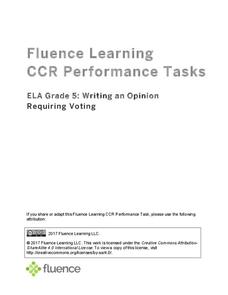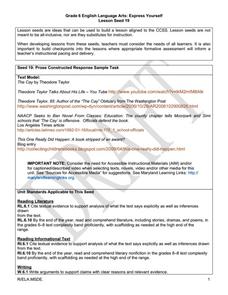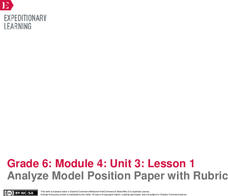Fluence Learning
Writing an Opinion Requiring Voting
Challenge writers to compose an essay detailing their stance on, and the history of, voting. Three assignments, each broken down into three parts, requires fifth graders to take notes, read and complete charts, write paragraphs, compare...
Fluence Learning
Writing an Opinion: Is Pride Good or Bad?
Does pride really goeth before the fall, or can it be essential to one's development? Second graders read two of Aesop's fables that refer to pride in their morals, and write a short essay about whether pride is good or bad, based on...
K20 LEARN
Introduction to Arguing Effectively: Argument Writing
Which is better—Chick-fil-A or MacDonalds? High schoolers learn how to craft an argument essay by beginning an opinion statement. They state a claim, back up their claim with evidence, and consider counter calms. Scholars then create a...
Southern Nevada Regional Professional Development Program
The Columnist Project
Imagine a list that includes Alan Abelson of Baron's, Bob Woodward of the Washington Post, and Mother Jones. High schoolers select a national columnist, read and annotate five columns by this author, noting the rhetorical strategies,...
EngageNY
End of Unit 2 Assessment, Part 1: Drafting The Argument Essay
Scholars write the draft of their essays about Atticus's decision to defend Tom Robinson in Harper Lee's novel To Kill a Mockingbird. They support their claims with reasons, details, and quotes from the novel.
EngageNY
End of Unit 2 Assessment: Final Draft of Literary Argument Essay
It's a common mistake. Scholars begin with a mini activity about common errors in draft essays. They then complete a stars and steps peer critique of essay drafts. To finish, learners revise their essays and finalize their drafts.
The New York Times
I Don’t Think So: Writing Effective Counterarguments
When it comes to writing effective arguments, writers must do more than simply make a claim, counterarguments must be considered. Aspiring writers analyze counterarguments in editorials, and then learn how to write counterarguments in...
Building Evidence-Based Arguments: Grade 9
New ReviewHigh schoolers investigate the dilemma of a proportional response with a lesson about the history of terrorism and militant extremists in the United States. As they examine memos from the FBI and speeches from President Bush and Obama,...
ReadWriteThink
Persuasive Essay: Environmental Issues
Young environmentalists learn how to craft a persuasive essay about an environmental issue they consider important. After studying the components of a persuasive essay and examining a student model, writers brainstorm possible topics and...
College Board
2018 AP® English Language and Composition Free-Response Questions
Discussions of eminent domain sometimes trigger strong emotions. A set of free-response questions from the 2019 AP® English Language and Composition exam tackles the concept with a series of persuasive pieces. Learners analyze all six...
New York State Education Department
English Language Arts Examination: June 2014
Should companies track consumers' shopping preferences without their permission? Using the resource, scholars write source-based argumentative essays to answer the question. They also answer reading comprehension questions based on an...
Curated OER
Express Yourself Lesson Seed 19: Synthesis
Wrap up your unit on The Cay with an engaging argumentative writing assignment. Writers must decide if they believe The Cay should be banned. The resource includes links to several articles, which have been addressed and examined in...
Anti-Defamation League
Should Washington's NFL Team Change Their Name?
"What's in a name?" Is it irrelevant, as Juliet suggests in Shakespeare's play, or is nomenclature deeply significant? Young scholars weigh in on the debate by examining the controversy over the NFL's Washington, D.C. Redskins. Groups...
EngageNY
Analyze Model Position Paper with Rubric
It's time to choose a position! Scholars read a model position paper about fracking to practice identifying the topic and argument. Then, working with a partner, they use a rubric to assess the essay.
Fluence Learning
Writing an Argument: Free Speech
How do you assess whether pupils have mastered certain concepts and skills? Designing a performance task that asks learners to demonstrate their skills and providing writers with a rubric that identifies these skills and provides...
Curated OER
Thesis Statement + Projected Plan = Introduction
Set up your writers for writing strong introductions with a formula for putting together supported thesis statements. This reference page breaks the process down and provides an example of how to compose a thesis statement, develop a...
Anti-Defamation League
Harriet Tubman on the $20 Bill: The Power of Symbols
How important are symbols and symbolic gestures in society? Middle schoolers have an opportunity to analyze the importance of symbols on American currency with a lesson that investigates the controversies surrounding redesigning the $5,...
EngageNY
Grade 9 ELA Module 4, Unit 1, Lesson 29
Writers review the provided essay rubric, edit and rewrite if necessary, polish their work, and then submit their argument essay.
Newseum
Slanted Facts and Slippery Numbers
The Internet is known as the information superhighway, but sometimes it's hard to know when to hit the brakes on unreliable sources. Using a well-rounded lesson plan, pupils read and summarize articles about the gender pay gap and...
Fluence Learning
Writing an Argument: Is Electronic Communication Helpful or Harmful?
Technology has undoubtedly improved the lives of people around the world—but has it improved communication? Seventh graders read two informative passages about the rise of texting and emailing versus in-person conversations before...
College Board
2017 AP® English Language and Composition Free-Response Questions
In the age of the Internet, are libraries still important? A collection of sources, part of a set of sample free-response questions from the AP® English Language and Composition exam, discuss that question. A variety of sources,...
Louisiana Department of Education
Out of the Dust
The Grapes of Wrath may be the most famous novel set during the Dust Bowl, but what other stories cover the same time? The unit focuses on the Karen Hesse novel Out of the Dust. Learners keep a timeline of the Dust Bowl, maintain a...
Cornell University
Fibers, Dyes, and the Environment
Nanofibers can be made through electrospinning or force spinning in order to reduce the negative impact on the environment. Pupils study the role of fibers and dye on the environment through a series of five hands-on activities. Then,...
K20 LEARN
Writing An Argumentative Paragraph: Argumentative Writing
Learning how to craft a cogent argument based on a solid claim, supported with evidence and solid reasoning, is an important life skill. Teach middle schoolers about argumentative writing with a lesson asking them to analyze the claims,...

























